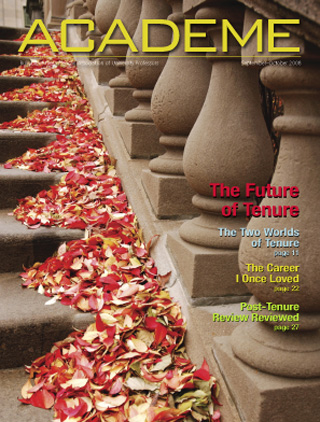Tenure: Use it (on behalf of those who don't have it) or lose it
By way of Erin O'Connor's Critical Mass comes Andrew Ross's very interesting twist on tenure in the most recent issue of Academe, the magazine of the American Association of University Professors:
 For those who still see tenure primarily as a form of job security, the larger economic context should be plain. On the landscape of work, there is less and less terra firma. No one, not even in the traditional professions, can any longer expect a fixed pattern of employment in the course of his or her lifetime. The rise in the percentage of contingent workers, both in low-end service sectors and in high-wage occupations, has been steady and shows no sign of leveling off. . . .
For those who still see tenure primarily as a form of job security, the larger economic context should be plain. On the landscape of work, there is less and less terra firma. No one, not even in the traditional professions, can any longer expect a fixed pattern of employment in the course of his or her lifetime. The rise in the percentage of contingent workers, both in low-end service sectors and in high-wage occupations, has been steady and shows no sign of leveling off. . . .
[T]enure is a tough sell to a general public for whom job security is more and more a fading memory. The case is even more complicated in the academic public sphere, where, for the contingent majority of permatemps, the privileges that accompany tenure are little more than a mirage in the desert. . . .
The primary reason for the existence of tenure . . . is to guarantee the right to academic freedom, not the right to lifetime employment. In principle, either tenure or academic freedom could subsist on its own, though in practice, job security is usually a precondition of the right to speak one’s mind freely. . . .
The upshot of Ross's essay? Those who value tenure would be well advised to use it to vindicate the welfare of two groups:
 For those who still see tenure primarily as a form of job security, the larger economic context should be plain. On the landscape of work, there is less and less terra firma. No one, not even in the traditional professions, can any longer expect a fixed pattern of employment in the course of his or her lifetime. The rise in the percentage of contingent workers, both in low-end service sectors and in high-wage occupations, has been steady and shows no sign of leveling off. . . .
For those who still see tenure primarily as a form of job security, the larger economic context should be plain. On the landscape of work, there is less and less terra firma. No one, not even in the traditional professions, can any longer expect a fixed pattern of employment in the course of his or her lifetime. The rise in the percentage of contingent workers, both in low-end service sectors and in high-wage occupations, has been steady and shows no sign of leveling off. . . .[T]enure is a tough sell to a general public for whom job security is more and more a fading memory. The case is even more complicated in the academic public sphere, where, for the contingent majority of permatemps, the privileges that accompany tenure are little more than a mirage in the desert. . . .
The primary reason for the existence of tenure . . . is to guarantee the right to academic freedom, not the right to lifetime employment. In principle, either tenure or academic freedom could subsist on its own, though in practice, job security is usually a precondition of the right to speak one’s mind freely. . . .
The upshot of Ross's essay? Those who value tenure would be well advised to use it to vindicate the welfare of two groups:
- Those without it in a profession that, more and more, is treating tenure as the domain of a sinecured, privileged few.
- Even more compellingly, workers in trades and professions that know neither job security nor expressive freedom.













0 Comments:
Post a Comment
<< Home